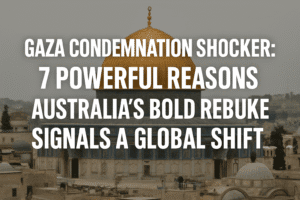Gaza Condemnation Shocker: 7 Powerful Reasons Australia’s Bold Rebuke Signals a Global Shift
Australian Prime Minister Anthony Albanese, representing a traditional ally, delivered a stark condemnation of Israel’s Gaza campaign, labelling attacks on civilians seeking food and water as “completely indefensible.” He revealed conveying this blunt message directly to Israeli leadership, warning that Israel’s own actions are eroding its global support. While reaffirming Australia’s long-term backing of Israel and commitment to a two-state solution (Israel and Palestine), Albanese stressed the United States remains central to achieving this goal.
His unusually strong public and private criticism highlights the profound moral crisis the conflict poses for Israel’s allies, amplified by the devastating toll: nearly 59,000 Palestinians killed, widespread destruction, famine conditions, and ongoing ICC/ICJ investigations into potential war crimes and genocide. This marks a significant shift in rhetoric from a key Western partner.

Gaza Condemnation Shocker: 7 Powerful Reasons Australia’s Bold Rebuke Signals a Global Shift
Australian Prime Minister Anthony Albanese has delivered one of the strongest rebukes yet from a traditional Israeli ally, labelling Israel’s attacks on Gaza, particularly those targeting civilians seeking aid, as “completely indefensible.” This unequivocal condemnation, reported by the ABC, marks a significant moment in the international response to the ongoing conflict and underscores a growing diplomatic rupture.
A Friend’s Frankness: Public and Private Condemnation
Albanese revealed he conveyed this blunt assessment directly to Israeli President Isaac Herzog, a long-time acquaintance, stating that Israel’s own actions are eroding its global support. “Sometimes you gotta be straight and upfront,” Albanese stated, framing Australia’s criticism as that of a concerned friend. This admission of private diplomatic pressure matching public statements highlights the depth of Australia’s concern and the perceived severity of Israel’s military tactics.
The Indefensible Act: Targeting the Desperate
The Prime Minister’s specific reference to reports of “aid seekers in the Gaza Strip being killed while waiting for food and water” anchors his condemnation in the dire humanitarian catastrophe unfolding. His words resonate against a backdrop of near-famine conditions and the deliberate obstruction of aid, making attacks on civilians queuing for sustenance particularly egregious.
Reaffirming the Two-State Imperative, with US at the Helm
Amidst the condemnation, Albanese firmly reiterated Australia’s commitment to a two-state solution as the only viable path to lasting peace. He acknowledged Australia’s historical support for Israel but stressed the foundational vision of two states: “the State of Israel and the State of Palestine.” Crucially, he positioned the United States as “central” to any future progress towards this solution, recognizing the indispensable, albeit currently strained, role of US diplomacy in the region.
Context: A War’s Mounting Toll and Legal Reckoning
Albanese’s remarks cannot be divorced from the devastating reality:
- Near 59,000 Palestinians killed: Overwhelmingly women and children, according to reports cited in the original article.
- Systematic Destruction: Gaza lies in ruins, with critical infrastructure decimated.
- Man-Made Famine: Israel’s restrictions have created catastrophic food insecurity and widespread disease.
- International Legal Action: The ICC has issued arrest warrants for Israeli PM Netanyahu and former Defense Minister Gallant for war crimes and crimes against humanity. Israel also faces a genocide case at the ICJ.
Why Albanese’s Words Matter: A Shift in the Wind
This isn’t merely criticism from a peripheral player. Australia has long been considered a reliable supporter of Israel within the Western alliance. Albanese’s language – “completely indefensible” – delivered both publicly and privately to Israeli leadership, signals a profound shift:
- Moral Clarity: It moves beyond cautious diplomacy to a clear moral judgment on specific Israeli actions.
- Ally Accountability: It demonstrates that even staunch allies are finding Israel’s conduct increasingly impossible to defend, warning of eroding support.
- Humanitarian Focus: It spotlights the unbearable human cost and the specific horror of attacking civilians in desperate need of aid.
- Pressure Catalyst: Such statements from traditional allies add significant weight to international calls for accountability and a ceasefire, potentially influencing other nations and key players like the US.
The Path Ahead: Condemnation Must Forge Change
While Albanese’s condemnation is powerful, it must be the precursor to sustained diplomatic pressure. The reaffirmation of the two-state solution, with the US playing a central role, is essential but feels distant amidst the current devastation. The world is witnessing not just a humanitarian disaster, but a potential turning point in how Israel’s actions are perceived and challenged by its traditional friends. The question now is whether this stark language translates into concrete international action to halt the killing, alleviate the suffering, and finally forge a just and lasting peace based on the coexistence of two states. The credibility of the international community, and allies like Australia, hinges on the answer.
You must be logged in to post a comment.